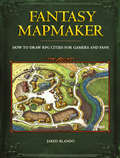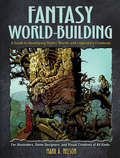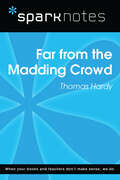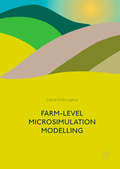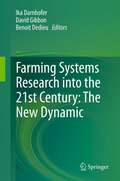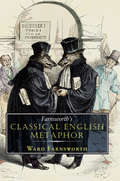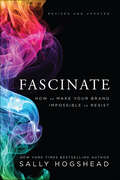- Table View
- List View
Fantasy Mapmaker: How To Draw Rpg Cities For Gamers And Fans
by Jared BlandoCreate authentic-looking maps of fantasy cities, hamlets, fortifications and more in a popular tabletop, RPG style. • 30+ step-by-step demonstrations show you how to create your own unique RPG maps • Learn how to draw fantasy cities, medieval settlements and more from a professional gaming illustrator • Tips and techniques for drawing fences, stone walls, forests, fields, bridges, footpaths, mountains, harbors, shields, coats of arms and other cartography elementsPut your design and drawing skills on the map!
Fantasy World-Building: A Guide to Developing Mythic Worlds and Legendary Creatures (Dover Art Instruction)
by Mark NelsonWhen artists and designers explore or create a fictional setting, the milieu must be completely fleshed out, explained, and designed. In this book, comic and gaming art veteran Mark A. Nelson explores and demonstrates his methods for fashioning visually stunning, believable environments for fantasy creatures and characters. Scores of images and step-by-step examples illustrate how variation and experimentation lead to fresh, original designs for otherworldly beings, their environments, and their stories.Nelson discusses how to find ideas and borrow from history to add the strength of realism to a fantasy world. In describing the best ways to establish a habitat, he offers specifics about climate, terrain, flora, and wildlife. He shares insights into founding societies in terms of their means of survival, manner of warfare, spiritual practices, style of dress, and levels of technology. All visual creatives who work with imaginative material — illustrators, comic artists, and writers — will take a lively interest in this source of inspiration and practical knowledge.
Far From The Madding Crowd: UBC contracted
by Thomas HardyThis story of an entrepreneurial young woman trying to make her way in a man's world is as pertinent today as it was when first published in 1874. The novel is set in rural England, where Bathsheba tries to succeed as a farmer, facing difficulties of weather or the sickness of her sheep. Equally difficult, though, are the choices she needs to make concerning the men who are interested in her, and the types of love they offer. This classic novel has lessons that are pertinent in South Africa today, where gender roles and difficult choices constantly affect lives. Far from the Madding Crowd contains a number of additional features, including: • An introduction that defines the key aspects of a novel and provides a more detailed understanding of certain features of this story: – The plot – The characters – A biography of the author – The context of the novel – The novel's relevance in South Africa today • Contextual questions and answers that help to create a deeper understanding of the novel and encourage learners to develop their own critical insights into the story; this section also stimulates discussion in the classroom so that learners can engage with each other • A glossary defining and explaining terms and phrases found throughout the novel, to aid learner's understanding of the text.
Far from the Madding Crowd (SparkNotes Literature Guide Series)
by SparkNotesFar from the Madding Crowd (SparkNotes Literature Guide) by Thomas Hardy Making the reading experience fun! Created by Harvard students for students everywhere, SparkNotes is a new breed of study guide: smarter, better, faster.Geared to what today's students need to know, SparkNotes provides:chapter-by-chapter analysis explanations of key themes, motifs, and symbols a review quiz and essay topics Lively and accessible, these guides are perfect for late-night studying and writing papers.
Farah Rocks Fifth Grade (Farah Rocks)
by Susan Muaddi DarrajFarah and her best friend, Allie Liu, are getting excited to turn in their applications to the Magnet Academy, where they both hope to attend sixth grade. But when new girl Dana Denver shows up, Farah's world is turned upside down. As Dana starts bullying Farah's little brother, Samir, Farah begins to second-guess her choice to leave him behind at Harbortown Elementary/Middle School. Determined to handle it on her own, Farah comes up with a plan--a plan that involves lying to those closest to her. Will her lies catch up with her, or can Farah find a way to defeat the bully and rock fifth grade?
Farah Rocks Fifth Grade (Farah Rocks)
by Susan Muaddi DarrajFarah and her best friend, Allie Liu, are getting excited to turn in their applications to the Magnet Academy, where they both hope to attend sixth grade. But when new girl Dana Denver shows up, Farah's world is turned upside down. As Dana starts bullying Farah's little brother, Samir, Farah begins to second-guess her choice to leave him behind at Harbortown Elementary/Middle School. Determined to handle it on her own, Farah comes up with a plan--a plan that involves lying to those closest to her. Will her lies catch up with her, or can Farah find a way to defeat the bully and rock fifth grade?
Farb- und Formpsychologie
by Tobias C. BreinerDieses Werk ist eine umfassende und praxisrelevante Darstellung zur Farb- und Formpsychologie. Mit einer klaren Sprache und über 100 farbigen Abbildungen wird Ihnen die komplexe Thematik auf eine wissenschaftliche und anregende Art veranschaulicht.Über eine allgemeine Einführung in die Grundlagen des visuellen Systems hinaus werden Sie ebenfalls spezielles Wissen zu Assoziationen, Wirkungen und Anwendungen bestimmter Farben und Formen erwerben. Speziellen Wert legt der Autor dabei auf deren Einsatz im Game Design. Es wird zudem erstmals eine neue Farbstudie präsentiert, die zeigt, dass die Assoziationen zu Farben sich in einem in sich logischen dreidimensionalen System anordnen lassen. Die daraus gezogenen überraschenden Erkenntnisse liefern mögliche Antworten auf fundamentale Fragen der Philosophie. Das Buch ist daher nicht nur ein Muss für Wahrnehmungspsychologen und Designer, sondern eine Bereicherung für alle an dieser Thematik Interessierten.
Farewell to Manzanar (SparkNotes Literature Guide Series)
by SparkNotesFarewell to Manzanar (SparkNotes Literature Guide) by Jeanne Wakatsuki Houston Making the reading experience fun! Created by Harvard students for students everywhere, SparkNotes is a new breed of study guide: smarter, better, faster.Geared to what today's students need to know, SparkNotes provides:chapter-by-chapter analysis explanations of key themes, motifs, and symbols a review quiz and essay topics Lively and accessible, these guides are perfect for late-night studying and writing papers.
Farewell, My Lunchbag
by Bruce HaleDanger may be Chet Gecko's business, but dessert is his delight. . . . Chet Gecko's hunger for mystery is matched only by his appetite for cockroach casserole, mosquito marshmallow surprise, and stinkbug pie. So when the cafeteria needs help nabbing a food thief, Chet digs into the case with a passion he usually reserves only for dessert. But this time Chet may have bitten off more than even he can chew. Someone has framed him, and now everyone at Emerson Hicky--even his trusted partner, Natalie Attired--thinks the food thief is none other than Chet!
Farm Animals (Readers)
by Joanne MatternAdult and child readers will learn all about adorable farm animals together in this new Co-reader from National Geographic Kids.
Farm Days (Penguin Young Readers, Level 2)
by William WegmanFamed photographer William Wegman and his iconic Weimaraners are headed to the farm!City boy Chip has been invited by his cousins to visit them on the Old McKay Farm. Chip learns how to plant a garden, mow the grass, and milk a cow. But it is hard work! Chip is ready to head back to the city at the end of the day.
Farm-Level Microsimulation Modelling
by Cathal O'DonoghueThis book, which is the first to be published in the emerging field of farm-level microsimulation, highlights the different methodological components of microsimulation modelling: hypothetical, static, dynamic, behavioural, spatial and macro–micro. The author applies various microsimulation-based methodological tools to farms in a consistent manner and, supported by a set of Stata codes, undertakes analysis of a wide range of farming systems from OECD countries. To these case studies, O’Donoghue incorporates farming policies such as CAP income support payments, agri-environmental schemes, forestry planting incentives and biomass incentives – in doing so, he illuminates the merits of microsimulation in this environment.
Farming Systems Research into the 21st Century: The New Dynamic
by Ika Darnhofer Benoît Dedieu David GibbonFarming Systems Research has three core characteristics: it builds on systems thinking, it depends on the close collaboration between social and biophysical sciences, and it relies on participation to build co-learning processes. Farming Systems Research posits that to contribute towards sustainable rural development, both interdisciplinary collaborations and local actor engagement are needed. Together, they allow for changes in understanding and changes in practices. This book gives an overview of the insights generated in 20 years of Farming Systems Research. It retraces the emergence and development of Farming Systems Research in Europe, summarises the state-of-the-art for key areas, and provides an outlook on new explorations, especially those tackling the dynamic nature of farming systems and their interaction with the natural environment and the context of action.
Farmingdale State College: A History (Excelsior Editions)
by Frank J. CavaioliLocated on 380 acres on the Nassau-Suffolk border, Farmingdale State College (FSC) is the oldest public college on Long Island. In this fascinating and lavishly illustrated history, Frank J. Cavaioli chronicles the school's rich history from the time it was chartered in 1912 up to the present. He investigates the leadership of such important directors and presidents as Albert A. Johnson, Halsey B. Knapp, Charles W. Laffin Jr., and Frank A. Cipriani, and demonstrates how they motivated faculty to create progressive, innovative programs, and urged them to give service to the community. The school's original mission was to provide training in agricultural science, but over time it has transformed into a comprehensive college focused on applied science and technology with a strong humanities and social science component. Now a campus of the State University of New York with nearly seven thousand students, the story of FSC is unique, one that mirrors the transformation and growth of the surrounding Long Island community.
Farnsworth's Classical English Metaphor
by Ward FarnsworthFarnsworth's Classical English Rhetoric was the definitive guide to the use of rhetorical devices in English. It became a best-seller in its field, with over 20,000 copies in print. Here now is the natural sequel, Farnsworth's Classical English Metaphor--the most entertaining and instructive book ever written about the art of comparison. A metaphor compares two things that seem unalike. Lincoln was a master of the art (A house divided against itself cannot stand). So were Jefferson (The tree of liberty must be refreshed from time to time with the blood of patriots and tyrants) and Shakespeare (All the world's a stage/And all the men and women merely players). Farnsworth's book is the finest collection of such figurative comparisons ever assembled. It offers an original analysis of patterns in the sources and uses of metaphor. It also explains the different stylistic ways that comparisons can be written, and with what effects. The book starts by dividing the sources of metaphor into families, including nature, architecture, animals, and myth. It then shows how the best writers have put each of those traditions to distinctive use-for the sake of caricature, to make an abstract idea visible, to make a complicated idea simple. The book provides, along the way, an extraordinarily wide-ranging tour of examples from novelists, playwrights, philosophers, and orators. There is interest, instruction, and amusement to be found on every page. Ward Farnsworth-lawyer, dean, teacher, and polymath-has produced another indispensable book for the writer. Classical English Metaphor will be a constant source of learning and enjoyment for anyone who appreciates the art of observation and the pleasure of well-chosen words.
Fart Squad #2: Fartasaurus Rex
by Stephen Gilpin Seamus PilgerIt's the second adventure from the smelt-it, dealt-it, you-can-fasten-your-seat-belt-but-they-might-melt-it . . . fearless FART SQUAD! This laugh-out-loud chapter book series is perfect for Captain Underpants fans. With black-and-white illustrations throughout and port-a-potties full of bathroom humor, young readers will be giggling from start to finish.When Darren Stonkadopolis and the rest of the Fart Squad are bussed off to the Natural History Museum, Darren melts a petrified tar pit with a volcano-hot fart. And when he does, he lets out what the pit had been holding in--the deadliest farter in all history, the ferocious Fartasaurus Rex. Now it's up to the Fart Squad to chow down, power up, and blast this prehistoric beast back to the Flatulent Age before the whole town becomes fossil fuel!"If you can smell what this dino had for lunch, you might be dinner!"--It's a Gas with Smooth Flo on WCPU"Fart attacks are up 82 percent all over the city. Sneak fart attacks are up 90 percent."--Good Morning, Buttzville"The business end of this dino means business!"--PassingtonPost.com
Fart Squad #3: Unidentified Farting Objects
by Stephen Gilpin Seamus PilgerIt's the third adventure from the bloaters of the big leagues, the stinkers to the stars, the gassians of the galaxy . . . the fearless FART SQUAD! This laugh-out-loud chapter book series is perfect for Captain Underpants fans. <P><P>With black-and-white illustrations throughout and porta-potties full of bathroom humor, young readers will be giggling from start to finish.When Darren Stonkadopolis claims he's had a close encounter of the stinky kind, the other Fart Squad members think he's full of hot air. But then the alien Stink Weeds descend, and the Fart Squad is forced to smell the truth. It'll take some Weedwacking, stealthy stench tactics, and buttfuls of gas so smelly they'd make the sun blush to stop these mutant extraterrestrial vegetables from universal stinkination.
Fart Squad #4: The Toilet Vortex
by Stephen Gilpin Seamus PilgerIt's the fourth adventure from the belly-bloating, plunger-toting, pants-exploding . . . fearless FART SQUAD! This laugh-out-loud chapter book series is perfect for Captain Underpants fans. With black-and-white illustrations throughout and a butt-load of bathroom humor, young readers will be giggling from start to finish.Something is rotten in the plumbing of Harry Buttz Elementary School, and it's kidnapped Janitor Stan!It's up to the Fart Squad to dive into the toilet vortex to save their scent-sei from the World of the Royal Flush. Grab a match, because this stink just got real. Only the Fart Squad has the guts, the gall, and the gas to flush this round brown mound before he overflows his toilet kingdom on the world.
Fart Squad #5: Underpantsed!
by Stephen Gilpin Seamus PilgerIt's the fifth adventure from the crack of the crop, the bum de la bum, the stink of the litter . . . the fearless FART SQUAD! This laugh-out-loud chapter book series is perfect for Captain Underpants fans. With black-and-white illustrations throughout and a butt load of bathroom humor, young readers will be giggling from start to finish.Underwear is disappearing all over Buttzville, and it's up to the Fart Squad to sniff out the villain who's brought the city to a chafing halt.But the heroes better hold on to their tighty-whities. Doctor Lucius René Bottom is out to pants the city that yanked his underwear business out from beneath him--and take the Fart Squad down, too. Get ready to go commando like no kid has gone before, because the Fart Squad is filling with fuel, gaining gas, and getting ready to kick some Bottom with the foulest fart attack in the history of Buttzville!
Fart Squad #6: Blast from the Past
by Stephen Gilpin Seamus PilgerIt’s the sixth adventure from the crack of the crop, the wild at fart, the first in gas, the fart-astic four . . . the fearless FART SQUAD! Here ye, here ye, good sirs and ladies! The magnificent Fart Squad has arrived to pull ye olde Golden Scratcher from a stone as tough as buns of steel.The Fart Squad must travel back in time to rescue the Golden Scratcher before Harry Buttz can get his hands on it—and leave the world in an itchy mess. Can the heroes of Buttzville cut the cheese on his stinky plan and save history? This laugh-out-loud chapter book series is perfect for Captain Underpants fans. With black-and-white illustrations throughout and a butt-load of kid-perfect humor, young readers will be giggling from start to finish.
Fart Squad (Fart Squad #1)
by Stephen Gilpin Seamus PilgerIt was an average day at Harry Buttz Elementary until . . . KABLAM! The five-bean burritos churning in Darren Stonkadopolis's stomach exploded in a fart so volcanic it melted his desk seat, knocked out his whole class, and got him sent to the nurse--and he's not alone.Something fishy is going on in Buttzville. And it's up to Darren and his three farting friends to combine their potty powers to get to the bottom of this evil plot--before it's too late. With their scent-sei, Janitor Stan, at their side, the Fart Squad has to learn to harness the powers between their butt cheeks. And then let it RIIIP."A flagrant romp. Not to be passed!"--The New York Toots"A cut above the rest."--StinkyCheese.com"If you haven't caught wind of Fart Squad yet, don't let this one go!" --Rude News"We've been dealt a winner!"--SmeltIt.blog.com
Farts Make Noise (Duke The Deaf Dog ASL Series)
by Kelly BrakenhoffDuke the Deaf Dog learns that some noises are loud and some are quiet. Whether it's a tapping crayon, a beeping fire drill, or a crinkly candy wrapper, both parents and children alike will understand the need to know the difference between noises. A fun, engaging way to teach children that some noises are not polite. <P><P><i>Advisory: This book offers only partial accessibility. We have kept it in the collection because it is useful for some of our members. Benetech is actively working on projects to improve accessibility issues such as these in the future.</i>
Fascinate: How to Make Your Brand Impossible to Resist
by Sally HogsheadThe New York Times–bestselling author shows you how the perfect words can captivate your customers and how your brand can harness the force of attraction.Why is Jägermeister the most popular brand nobody likes? Why do women pay more to be fascinating than they spend on food and clothes? What raises the price of gummy worms by 1000%?And then there’s the most important question of all: How can your brand become impossible to resist? Master marketer Sally Hogshead reveals the surprising answers, providing readers with a framework to fascinating anyone.This extensively revised and updated edition includes Hogshead’s latest research on the science of fascination. Combining original case studies with award-winning copywriting experience, she gives you the exact words you need to capture the attention of a distracted world.This new edition includes a free assessment tool called the Brand Fascination Profile, which will help you earn attention in any environment by learning how to:Increase prices with ideas from poker to Play-DohBuild revenue by learning about the $14 million license plateGet better leads through hypnosis by Sigmund Freud and Steve JobsAttract raving fans by following the cult of pistachio ice creamWhether you realize it or not, your brand is already applying one of the seven Advantages Hogshead describes here: Innovation, Passion, Power, Prestige, Mystique, Alert, or Trust. The question is, how can you apply these core Advantages to stand out in a crowded and distracted world? Hundreds of large corporations, small businesses, and universities—including Twitter, IBM, Porsche, and New York University—use the Fascinate system to captivate their customers. Why? The answers are in this book.
Fashion Academy
by Sheryl Berk Carrie BerkProject Runway meets Fame in a trendy new series from the authors of The Cupcake ClubAt the Fashion Academy of Brooklyn, FAB is a way of life. Fashion-forward MacKenzie "Mickey" Williams is thrilled to be accepted to FAB Middle School (Fashion Academy of Brooklyn), a school that serves as a training ground for the fashion designers of tomorrow. (Their motto, "We are SEW FAB"). But when her daring fashion and stellar grades turn the Fab A-listers green with envy, Mickey discovers that standing out doesn't always make it easy to fit in. So when friendly classmate JC comes up with a plan to help Mickey fit in, she decides to take the ultimate fashion risk-ditch her personal style for good. One mega makeover later, pink-haired Mickey Williams mysteriously disappears, and the trendy, blonde "Kenzie Wills" shows up on the FAB scene, blending with the other students in a way Mickey never could. But when Mickey starts to lose herself to "Kenzie," she's not sure that fitting in is worth cutting herself down to size. . .
Fashion Figures
by Melissa A. BorzaMissy Maker is a middle school girl who loves math and fashion. She sees math in everything she does. She tries to hide this from her friends, because she thinks it's too geeky. Missy hears that the school math club needs more members, but she's worried about what her friends will think if she joins, and she's already committed to joining the fashion club. After an epic internal struggle and with the support of her peers and her quirky, loving family, Missy finds that she can be both a Mathlete and a Fashionista. Missy figures out how to bring the two clubs together to help both groups win. In the process, she discovers that she can openly excel in math and science and still be popular with her peers. She also learns how her math and science skills can help her artistic endeavors. Gain an inside perspective on what it's like when you love math and science and happen to be a girl. Fashion Figures highlights the societal and internal pressures preteen and early-teen girls often face when they excel in these subjects, and it shows strategies for overcoming barriers to being themselves and doing what they love while still fitting in socially. What You'll Learn Girls can have a passion for STEM (science, technology, engineering and math) subjects and still be cool Girls can be great at math Math skills are important in non-STEM centered subject areas like fashion and art Math can be fun Who This Book Is For Pre-teen and early-teen girls (9-14 years old)
